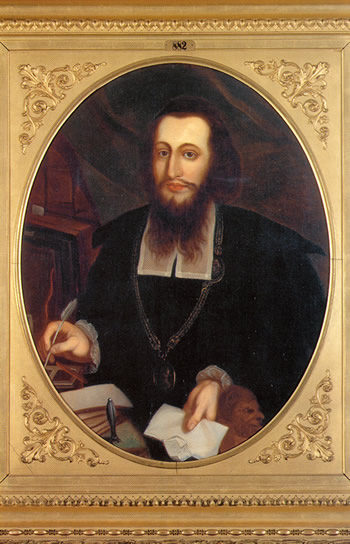My family tree traces its way back to Samson Wertheimer, who lived some 300 years ago in Vienna. Samson was a rabbi and philanthropist who was also the finance minister to Emperor Leopold I; he was entrusted with the financial secrets of the country. He was known not only for his affluence and govermental influence, but also for his wisdom and refined character. At least I inherited the latter two 😉
At one point, a certain bishop became close to the king. It vexed the bishop that a Jew had so much power in the government, and he became determined to get rid of Samson. 

“Your majesty,” the bishop approached the king, “this Wertheimer whom you have trusted with the finances of the country — perhaps he is not as reliable as you think?”
“Are you insinuating that Samson is cheating me?!” asked the king. “Do you have any proof for such allegations?”
“I certainly do! I saw a copy of his personal finance books, and I was shocked to discover his tremendous wealth. The king should ask Wertheimerhow much he is worth. If he mentions a smaller sum, then you know that he is a liar and you are being cheated!”
“Ok,” replied the king, “I will investigate this important matter!”
“If your majesty permits me,” continued the bishop, “I request one thing. If it is indeed proven that Wertheimer has lied, then he should be burnt alive. You might as well prepare the furnace.”
The king, now under the influence of the bishop, ordered his men to prepare the furnace. He also gave orders to his men that if anyone asked the executioner, “Have you carried out the king’s order?” they should be thrown into the furnace!
Samson was ordered to appear before the king, who initiated a friendly discussion, eventually turning to monetary issues.
“Tell me, Samson, approximately how much is your personal wealth? You need not tell me to the exact guilden, but how much are you certain of?”
After pausing for a moment, Samson mentioned a certain sum.
Hardly containing his anger, the king ordered Samson to go to the furnace and ask the executioner if they had carried out the king’s orders.Samson had mentioned an amount that was approximately 10% of what he was alleged to own!
Samson went without hesitation, for he did not know the fate that was waiting for him.
On the way, he met someone who said, “Shalom aleichem, Rabbi Wertheimer! I was blessed with a new born son, and today he is eight days old! I am so excited to fulfill the commandment of circumcision, yet I am not trained in ritual circumcision. Will you accompany me and perform the circumcision?”
Samson was a mohel, a person trained in ritual circumcision, as instructed to our patriarch Abraham in this week’s Torah portion, and later to Moses at Mt. Sinai. Yet he had a dilemma, and told this new father, “The king has sent me on an errand; how can I delay?!”
“That may be the case,” replied the father, “but I have been sent by the King of kings! How are we to delay this holy mitzvah (commandment)?!”
Samson accompanied the eager father to his home, which was filled with guests. After the bris milah ceremony, Samson sat down to partake of the celebratory meal with the family and their guests. As it was a festive occasion, Samson pronounced l’chaim with the father, and joined him in drinking a glass of wine. He felt a bit dizzy, and lay down to rest. None of the guests dared to awaken their esteemed guest…
That night, the bishop couldn’t sleep. He had been informed that the king had sent Wertheimer to the furnace, and wanted to make sure that the orders had been carried out. When he reached the furnace, he asked the executioner, “Have you carried out the king’s orders?”
“We’ve been waiting for you!” the executioner responded, grabbing him quickly and throwing him into the furnace.
The next morning, Samson awoke at the home where he had performed the bris milah ceremony. He recalled that he had been sent by the king on a mission, and hurried to carry out his wishes. Upon reaching the furnace, he was told of the fate that had become of the bishop.
Confused, he ran to the king. He apologized for not having been able to carry out the king’s wishes immediately, explaining that he had been called to assist in an urgent situation. “As per your command,” Samson reported to the king, “the bishop has been burned.”
“What?” exclaimed the king. He proceeded to tell Samson the whole story, concluding, “you must certainly be a righteous man, for you have been spared an untimely death. But tell me, why did you lie about the amount of your wealth?”
“I did not lie! When the king asked me how much I was certain that I possessed, I could not reply with the amount written in my financial record books, for that is not truly mine. The only possessions that I am certain are mine are those that I have donated to charity; they can never be taken from me. Jewish tradition mandates that one give at least 10% of one’s earnings to tzedakah (charity), and that is the amount that I told you…”

